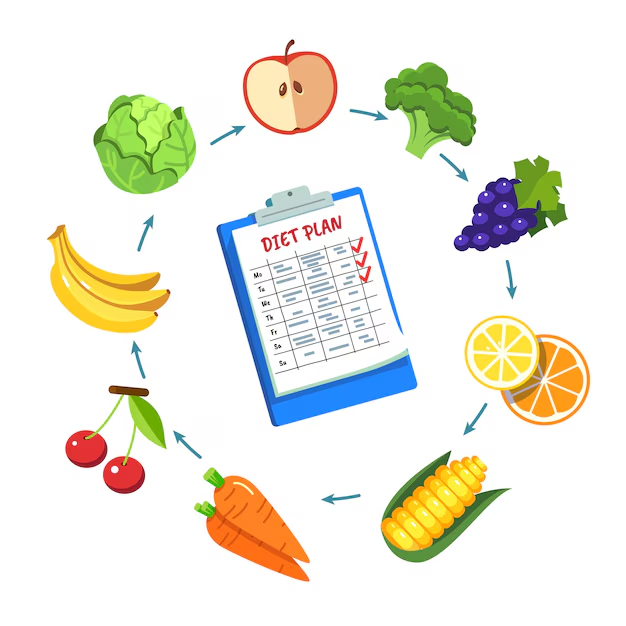7 Day Thyroid Diet Chart For Weight Loss: By Expert Dietitian
Managing your thyroid health is key to achieving and maintaining a healthy weight. Whether you’re dealing with hypothyroidism or hyperthyroidism, a carefully planned thyroid diet can support better thyroid function, weight loss, and overall well-being.
In this article, we’ll explore the importance of a thyroid diet for weight loss and present a 7-day thyroid diet plan tailored to boost your thyroid health while aiding in weight management.
What is a Thyroid Diet?
A thyroid diet is specifically designed to support the health of the thyroid gland, which plays a critical role in regulating metabolism and overall body function. The thyroid produces hormones that influence everything from your energy levels to your heart rate. A well-balanced thyroid diet consists of nutrient-dense foods that support proper thyroid hormone production, while avoiding foods that may interfere with thyroid function.

People with thyroid conditions, such as hypothyroidism, can benefit from a diet that includes foods rich in essential nutrients like iodine, selenium, and zinc, while avoiding goitrogenic foods (foods that can interfere with thyroid hormone production).
Why is a Thyroid Diet Important for Weight Loss?
A healthy thyroid diet is crucial for weight management, especially for individuals dealing with thyroid disorders like hypothyroidism, which can lead to weight gain. For those with hypothyroidism, metabolism slows down due to insufficient thyroid hormone production, leading to increased difficulty in losing weight. On the other hand, hyperthyroidism can cause unintentional weight loss due to an overactive metabolism.
By following a thyroid diet rich in foods that support thyroid hormone production and avoiding processed and goitrogenic foods, you can help regulate your metabolism, making weight loss easier and more sustainable.
Common Thyroid Disorders (Hypothyroidism and Hyperthyroidism)
Thyroid disorders come in two primary forms:
- Hypothyroidism: Hypothyroidism occurs when the thyroid gland does not produce enough thyroid hormones. This results in a slower metabolism, weight gain, fatigue, and other symptoms like dry skin and hair loss. It’s often managed through medication and diet adjustments.
- Hyperthyroidism: Hyperthyroidism is when the thyroid gland produces too much thyroid hormone, speeding up metabolism. This can lead to symptoms such as unintentional weight loss, anxiety, and irregular heartbeats. Treatment may involve medication, diet changes, and, in some cases, surgery.
These conditions directly affect weight because they influence metabolism, how the body stores fat, and how it uses energy. A well-balanced thyroid diet can help mitigate these effects.
How Thyroid Disorders Affect Weight
Thyroid disorders impact the way your body processes and stores fat. When your thyroid hormone levels are off-balance, your metabolism can slow down (hypothyroidism) or speed up (hyperthyroidism), affecting your ability to gain or lose weight. In hypothyroidism, the slow metabolism can make it difficult to burn calories, often resulting in weight gain.

On the other hand, people with hyperthyroidism may struggle to maintain a healthy weight due to rapid calorie burning and muscle loss. A well-structured thyroid diet can help regulate your metabolism and support healthier weight management by promoting a balanced thyroid function.
The 7-Day Thyroid Diet Plan for Weight Loss
This 7-day meal plan is designed to be rich in iodine, selenium, and zinc, which are critical nutrients for thyroid health. It includes a balance of protein, fiber, and healthy fats to promote weight loss while supporting the thyroid.
| Day | Breakfast | Lunch | Dinner | Snacks |
|---|---|---|---|---|
| Day 1 | Oats with almonds and chia seeds, green tea | Grilled chicken salad with olive oil & lemon | Lentil soup with brown rice, steamed spinach | Roasted nuts, a glass of buttermilk |
| Day 2 | Idli with sambar, herbal tea | Rajma with brown rice and a side of mixed vegetables | Grilled fish with quinoa and stir-fried broccoli | Fruit salad (papaya, apple, and banana) |
| Day 3 | Poha with peanuts and green tea | Grilled paneer with whole wheat roti and mixed greens | Dal with brown rice, steamed veggies (carrots, beans) | Sprouts with a dash of lemon and salt |
| Day 4 | Scrambled eggs with spinach and multigrain bread, green tea | Quinoa salad with chickpeas, cucumber, and olive oil dressing | Chicken curry with brown rice and a side of sautéed vegetables | Apple slices with peanut butter |
| Day 5 | Moong dal chilla with mint chutney and green tea | Paneer bhurji with whole wheat roti and a green salad | Methi paratha with curd and a bowl of mixed dal | Mixed fruit salad with yogurt |
| Day 6 | Upma with vegetables, herbal tea | Grilled chicken wrap with whole grain tortilla and salad | Grilled tofu with sautéed vegetables and quinoa | Handful of walnuts and raisins |
| Day 7 | Smoothie with spinach, banana, and almond milk | Fish curry with brown rice and sautéed leafy greens | Paneer tikka with roti and a side of grilled vegetables | Roasted chickpeas |
Key Foods to Include in Thyroid Diet Chart
For people with thyroid conditions, certain foods can support thyroid function and promote overall health. Below is a list of essential foods to include in your thyroid diet plan:
A thyroid-friendly diet should also include antioxidant-rich fruits and vegetables, healthy fats like olive oil, and omega-3-rich foods such as fatty fish to support overall thyroid health and reduce inflammation.
Conclusion
Following a thyroid diet tailored to your specific thyroid condition can significantly support your weight loss efforts and overall health. The 7-day thyroid diet chart provided here is designed to balance your thyroid hormones, boost metabolism, and help you achieve a healthy weight. With the inclusion of iodine, selenium, and zinc-rich foods, along with a well-balanced meal plan, you can improve thyroid function and aid in weight loss.
For a personalized diet plan that fits your unique thyroid condition and health goals, consider consulting with Dt. Ila Sharrma. As an expert dietitian specializing in thyroid health, she can help guide you through a comprehensive diet plan that supports both weight loss and thyroid function.












